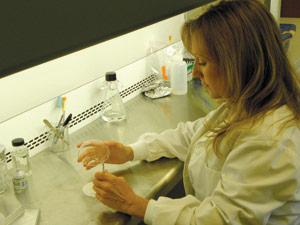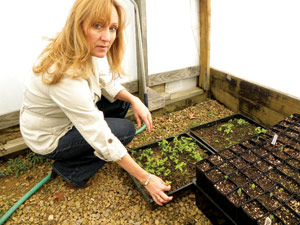Plant lovers mosey in and out of The North Carolina Arboretum every day, admiring the plants and the landscape around them. Most, though, are totally unaware of the small, twin labs tucked away in the less-visited greenhouse. The Bent Creek Institute, launched several years ago with support from groups like Mission Hospitals, the Buncombe County commissioners and the N.C. Biotechnology Center, focuses on conservation and long-term seed storage. Xpress met with Joe-Ann McCoy, director of the institute's Germplasm Repository, to get the lowdown.

Mountain Xpress: How did you wind up at the institute?
Joe-Ann McCoy: I was always into plants as a kid. I graduated from UNCA with a degree in environmental studies, did my master's at Clemson, where I started my medicinal-plant research, and did my Ph.D. there, also in plant physiology. I worked for the USDA at Iowa State University on a National Institutes of Health project for four years before coming here.
What's the Germplasm Repository all about?
Germ plasm is hereditary material passed from one generation to the next. We're following the USDA model here in developing a germ-plasm repository for medicinal and native regional plants. I have a database of 6,500 medicinal plants; I have 2,000 targeted taxa from this region. We need to get everything in the seed bank, because climate change is going to change the region. Some plants aren't going to be able to move. For example, the spruce/fir zone. If global warming increases, where do they go? They've already been pushed up.
How do you collect germ plasm?
We have a very rigid method in the field. We collect GPS coordinates, elevation aspects, slope, directions to the site, associated species, number of individuals, number of flowering individuals. We dry the seeds down to about 5 to 7 percent moisture at a controlled relative humidity. Then we vacuum-seal in these trilaminate aluminum packets that are patented just for seed storage; the same packaging the Nordic Gene Bank uses. Then we freeze those seeds at minus 20. That method has been proven to give the longest seed storage possible . Some will last for 100 or 200 years.

This kind of work must keep you outdoors.
I never get outside. We do when we collect, but we've been behind the computer way too much lately writing grants. We're mostly grant-funded.
Can you give an example of a grant project you're working on?
We have a grant with WCU to develop a regional cultivar of black cohosh, which is native only to the eastern U.S. We have 20 collections representing all that range. We'll compare the triterpene glycosides, the proposed active ingredient, in all those populations and find the two best. Then we'll do selection and breeding and develop a regional cultivar for growers here.
Why is black cohosh so important?
Black cohosh is one of the top-10-selling dietary supplements and has a huge market in Europe, China and the U.S. It only grows in North America, but Germany has the biggest commercial product. They sell it back to us in every one of our Wal-Marts, Eckerds, etc. They were way smarter than us. We buy back from other countries; we need to be doing it here.
What does the future hold for the Bent Creek Institute?
We have an extraction lab next door. We want to develop an extract collection of all the native species here [to help identify] potential products. This region really hasn't been looked at thoroughly, ever. Usually people want to go to Africa, South America. This is one of the most bio-diverse regions in the U.S. This is a very special place, plantwise. Since we're collecting already, we need to make our collection useful, because you can't fund anything just on conservation anymore. Unfortunately, it's a really noble cause, but we can't stay funded if it's just conservation, if we're just collecting the seed and storing it.
That sounds like a lot of work. Do you use volunteers in any of your projects?
We have 10 volunteers who work for us two or three afternoons per week. They sort the seed by hand and do all of our seed cleaning. They are so dedicated.
What do you say to critics of the institute?
We're not opportunistic scavengers; I don't make a huge salary. We want this region to develop scientifically. We work well with others. We can come up with a project with a farmer or a rocket scientist.
To learn more about volunteering, go to http://bentcreekinstitute.org. Send your environmental news to mvwilliams@mountainx.com or call 251-1333, ext. 152.
[Freelance writer Jonathan Poston lives in Asheville.]




Very cool! Thanks, Jonathan!